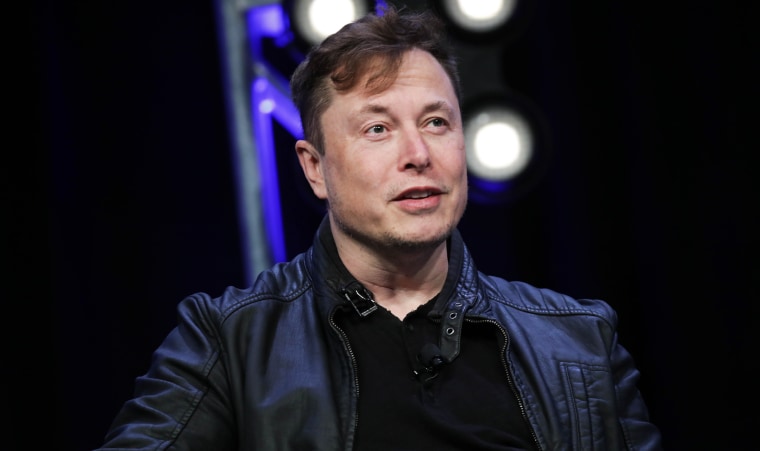Tech magnate Elon Musk took the stage at a conference Thursday and began sketching out a vision for Twitter for if he succeeds in buying the company, while also lobbing insults at government regulators and rival billionaire Mark Zuckerberg.
Musk's appearance at the TED2022 conference in Vancouver, British Columbia, was his first in public since he made a more than $40 billion takeover offer for San Francisco-based Twitter hours earlier.
Musk, the CEO of automaker Tesla and the world's wealthiest person according to Bloomberg and Forbes, hammered Twitter for having rules he said were too restrictive of online speech.
"We want to have the perception and the reality that speech is as free as possible," Musk said in an onstage interview conducted by Chris Anderson, the head of the conference.
"A good sign as to whether there's free speech is: Is someone you don't like allowed to say something you don't like? And if that is the case, then we have free speech," he said.
He said Twitter has become so important to the functioning of democracy that there's "civilizational risk" if people lose trust in it.
"Having a public platform that is maximally trusted and broadly inclusive is extremely important to the future of civilization," he said.
Musk provided few details on how he would rewrite the rules and did not give specific examples of speech that he thought Twitter had unfairly restricted, but he sketched a vision of a Twitter that would be generally less moderated. "If in doubt, let the speech, let it exist," he said.
At times he appeared to contradict himself, saying Twitter should "match" the laws of each country regarding speech — which could open the door to more hate speech on the service in the U.S. — while also saying the company "needs human judgment" to evaluate potentially violent speech.
He also said he might be wrong.
"I don’t know if I have all the answers here," he said. "But I do think that we want to be just very reluctant to delete things and just be very cautious with permanent bans. Timeouts, I think, are better than sort of permanent bans."
Twitter's most famous ban was of former President Donald Trump in early 2021, after the Jan. 6 attack on the U.S. Capitol by Trump's supporters. By then, Trump's critics had been asking Twitter for years to ban Trump, but the social media service had resisted, even rewriting part of its rulebook in 2018 so essentially world leaders like Trump could break some rules without losing their accounts.
Twitter once took a nearly absolutist view of online speech. In 2011, then-CEO Dick Costolo called the company "the free speech wing of the free speech party," but in recent years, after demands from users and advertisers, Twitter has amended its terms of service to crack down on targeted harassment, hateful imagery and other mistreatment.
Musk said another top priority he would have for Twitter is eliminating spam and scam bots, an area in which the company already spends resources but has failed to stamp out the problem entirely.
He also said he would favor an edit button for altering tweets after a person sends them, at least for a short period of time. "I'm open to ideas," he said.
As for a potential Twitter takeover, Musk said he did have sufficient assets to purchase the company.
Anderson, the interviewer, pressed Musk on whether it was really a good idea for the world’s richest person to control an “incredibly important town square” such as Twitter.
Musk responded by noting that Zuckerberg has majority control of three of the world’s most widely used apps and that Zuckerberg could pass that ownership to his heirs.
“You’ve got Mark Zuckerberg owning Facebook and Instagram and WhatsApp, and with an issue ownership structure that will have Mark Zuckerberg the 14th still controlling those entities,” Musk said.
He added that he would open up Twitter’s “blackbox algorithm” to public inspection to try to build public confidence in the platform.
Musk and Zuckerberg have a years-old public feud, including a debate in 2017 over the likelihood that robots powered by artificial intelligence might one day kill their human creators.
Musk's SEC battle
Wearing a black suit and white shirt, Musk answered questions on a wide array of subjects including his unhappy childhood, his experience with Asperger's syndrome, his decisions at Tesla and his legal battles with the Securities and Exchange Commission.
In 2018, Musk and Tesla agreed to pay $40 million in a settlement over an SEC investigation into statements Musk had made about the automaker on Twitter. He had tweeted that he had "funding secured" to take the electric carmaker private, a statement he said he still stands by.
"I was told by the banks that if I did not agree to settle with the SEC, that the banks would cease providing working capital and Tesla would go bankrupt immediately," Musk said Thursday.
"That’s like having a gun to your child's head," he said. "So I was forced to concede to the SEC unlawfully — those bastards."
Twitter declined to comment on Musk's conference remarks. The SEC did not immediately respond to a request for comment.
Ben Goggin contributed reporting to this piece.
